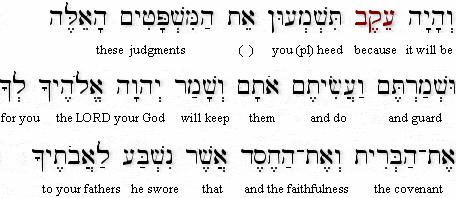 Parshat Eikev (Deuteronomy 7:12–11:25) — In the Parshah of Eikev, which means “because” in English, Moshe continues in his last 37 days of life to prod his people to remain faithful and true in their ensuing voyage of destiny. He describes the promise of this bountiful land.
Parshat Eikev (Deuteronomy 7:12–11:25) — In the Parshah of Eikev, which means “because” in English, Moshe continues in his last 37 days of life to prod his people to remain faithful and true in their ensuing voyage of destiny. He describes the promise of this bountiful land.
The first two words in the portion seem to contradict one another. The first word VeHaya — and it shall be — is one of the biblical code words pointing to anticipated happiness. The next word eikev — because — on the other hand is rooted in the word for heel and denotes difficulty and travail.
How do those two concepts come together?
He also reminds them of their difficult moments with the golden calf, and the sin of the pies and the “graves of lust”.
Why remind them of their failings if in fact Moshe wanted to encourage in the future?
Moshe then reminds them of the bread from heaven, the manna. He declares that this was to teach them “that man does not live on bread alone, but by the utterance of G-d’s mouth does man live.”
Yet man is sustained by bread, so what does G-d mean? And which bread is He alluding to?
The key passages in this portion declare the second chapter of the Shma prayer.
How is it different than the first chapter we read in the previous portion?
Moshe also describes the land they are about to enter as “flowing with milk and honey.” He then describes how it is blessed with seven blessed species — wheat, barley, grapevines, figs, pomegranates, olive oil and dates. Each one of those species are used in the Biblical writings as important spiritual metaphors.
What are those metaphors?
Moshe reminds them that this land of Israel was to be the focus of their physical yearnings and would be the resting place of their spiritual lives. Yet on the other hand he warns them that their success in the wars against the former inhabitants should not lead them into the sin of believing “my power and the might of my hand have gotten me this wealth.”
Listen to this week’s podcast.
